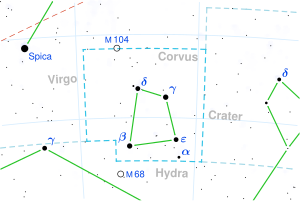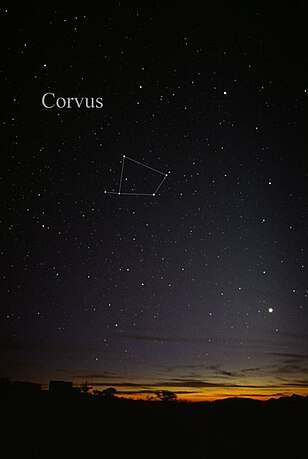Rabe (constellation) – Wikipedia
| Constellation Rabe |
|
|---|---|
 |
|
| Astronomischer Name | Raven |
| Genitive | Crows |
| Abbreviation | CRV |
| Rectasts’SION | 11 h 56 m 22 s until twelfth h 56 m 40 s |
| declination | −25 ° 11 ′ 46 ″ until −11 ° 40 ′ 39 ″ |
| Surface | 183,801 you² Roast 70 |
| Vollständig Sichtbar | 65.1 ° N to 90 ° S |
| Observation time for Central Europe | spring |
| Number of stars brighter than 3 Mag | 3 |
| Lightest star (size) | Gamma Corvi (2.59 MAG) |
| Meteor stream | |
| Neighboring displays (From the north in Clockwise) |
|
| Sources | I TAKE |
 The raven constellation, as it can be seen with the naked eye |
|
The Rabe (Latin Raven ) is a constellation south of the sky equator.
The raven is a small constellation north of the water snake, with which it is also in a close mythological relationship. The four brightest stars with an apparent brightness by 2.5 to 3 m Form a striking square.
The best time for observations are the months of March to May.
The raven is one of the 48 constellations of ancient astronomy, which have already been mentioned by Ptolemy.
In Sumer and Babylonia, the stars of the raven were known as Uga/Kakkab Aribu and belonged to the weather god Adad. In Greek mythology, the raven is associated with the constellation cup and the water snake:
Apollon sent out the raven for an offering to his father Zeus so that he gets water from a source. The raven grabbed the cup and set off. On the way there, however, he did not yet see figs on a fig tree, from which he absolutely wanted to cost. So he waited a few days until the figs matured and only then ended his order. In order to have an apology for his late late coming, he grabbed a water snake and claimed that it had blocked the way to the source.
Apollon, however, looked through the lie and punished the ravens by that he can no longer drink at the time of the femoral maturity, and put it in the sky to warning, together with the cup and the water snake.
In another story, the raven is also banished to the sky out of punishment. He told Apollo that his pregnant lover Koronis was strangers. Apollon killed Koronis and their plays out of anger. However, he immediately regretted this and he was able to save the life of his unborn son. As a punishment, Apollo colored the white raven black and banished it to the sky.
Meteor stream [ Edit | Edit the source text ]
The meteor current of the Corvids can be observed in the period of June 27th and 28th.
Stars [ Edit | Edit the source text ]
| B | F | Name O. Other names | Size | Lj | Spectral class |
|---|---|---|---|---|---|
| c | 4 | Gamma Corvi, Gienah Ghurab | 2.59 m | 190 | B8 3 |
| b | 9 | Beta Corvi, Kraz | 2.65 m | 140 | G5 II |
| d | 7 | Algorab | 2.94 m | 120 | B9 v |
| e | 2 | Remembrance | 3.02 m | 303 | K2ail |
| a | first | Alchiba | 4.02 m | 49 | F2 IV |
| Z | 5 | 5.20 m | 360 | ||
| the | 8 | 4.30 m | |||
| 3 | 5.45 m | ||||
| 6 | 5.66 m |
Gamma Corvi is with an apparent brightness of 2.6 m The brightest star in the raven. It is a 190 light year of distant bluish and white star of spectral class B8. The name Gionah is of Arab origin and means “swinge”.
Beta Corvi, 96 light years away, is a yellowish star of spectral class G5.
The names of the stars Minkar (ε Corvi) and Alchiba (α Corvi) are also Arabic and mean “beak” and “tent”.
The Dopelsterne [ Edit | Edit the source text ]
| System | Sizes | Distance |
|---|---|---|
| d | 3.0 m /9,2 m | ” |
| Z | 5.2 m /13,7 m |
Delta Corvi (Algorab from Arabic al-jurāb , “The raven”) is a double star system at around 120 light years away.
Valuable stars [ Edit | Edit the source text ]
R Corvi is a long -period -changing star of the Mira type. Over a period of 317 days, its brightness changes from 6.7 to 14.4 m .
Measurement and NGC objects [ Edit | Edit the source text ]
In the raven there is the galaxy couple NGC 4038 and NGC 4039. Both galaxies were strongly deformed by the mutual gravitational effect, with two thin filaments visible on long -exposed photographs, which are reminiscent of antennas.
The planetary fog NGC 4361 is about 4,300 light years away. In the center is the 12.8 m Light central star, a white dwarf.
Recent Comments